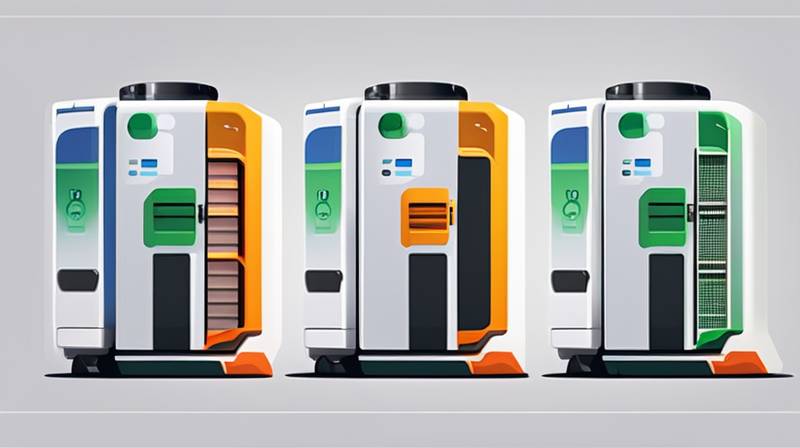
The cost of a mobile energy storage cabin can vary widely based on several factors. 1. Price ranges typically span from $10,000 to over $100,000, depending on the size and capacity of the unit. 2. Customization options can significantly impact the final cost; features like solar integration, battery type, and additional technology can add to the overall expenditure. 3. Market demand and supply chain considerations also play crucial roles in pricing. 4. Geographic location impacts shipping and installation costs, which should be factored into the total investment. For example, a mobile energy storage cabin designed for extensive off-grid applications may be equipped with state-of-the-art lithium-ion batteries, control systems, or even renewable energy options, causing the price to climb sharply.
1. FACTORS INFLUENCING COST
When assessing the financial implications of acquiring a mobile energy storage cabin, multiple factors come into play. Primarily, the capacity of the system—measured in kilowatt-hours (kWh)—determines the basic price structure. Larger systems designed for commercial applications generally carry higher price tags than their residential counterparts, which are smaller and less complex.
Secondly, the choice of technology significantly influences cost. Many modern units utilize advanced lithium-ion batteries, known for their efficiency, longevity, and energy density. However, these materials also come at a premium. Older technologies such as lead-acid batteries may provide a less costly option upfront but often have lower overall performance and shorter life cycles. Therefore, it’s essential to weigh initial investments against long-term operational costs and efficiency.
2. DESIGN AND CUSTOMIZATION OPTIONS
Customization can significantly alter the pricing of a mobile energy storage cabin. Optional features, such as solar panel integration, advanced inverter systems, and monitoring systems, can turn a basic unit into a sophisticated energy management solution. This flexibility allows users to select features that best match their energy needs, but it also introduces a wide cost variance.
The design aspect is another critical area to consider. Mobile energy storage cabins can be designed for various applications, from residential energy backup solutions to large-scale commercial deployments. Depending on the intended use, the construction materials and design specifications can vary considerably. Higher-quality materials and specialized designs aimed at enhanced durability or aesthetic appeal can increase costs as well.
3. MANUFACTURER AND SERVICE PROVIDERS
The choice of manufacturer plays a significant role in determining the price of a mobile energy storage cabin. Reputable manufacturers, known for their product quality, customer support, and warranties, might charge a premium for their offerings. In contrast, newer or less-established entities may offer lower prices but come with varying levels of reliability.
Additionally, it’s advisable to consider the full-service offerings of the provider. Some manufacturers include installation, maintenance, and ongoing technical support as part of the package. These aspects can greatly affect the initial investment and long-term satisfaction. Buyers must determine what level of service is included and how that correlates to potential expenses down the line.
4. TOTAL COST OF OWNERSHIP
When calculating the ultimate financial commitment, the concept of total cost of ownership (TCO) is vital. This encompasses not just the purchase price but also installation costs, utility savings, maintenance fees, and potential financing expenses. Understanding TCO allows consumers to draw comparisons between different storage solutions more effectively.
Moreover, energy storage systems are often evaluated based on their return on investment (ROI). The savings afforded by stored energy, especially in environments with fluctuating electricity costs or increasing utility prices, can significantly influence the long-term value proposition of the cabin. Thus, it is crucial to analyze the potential financial benefits alongside the initial acquisition costs.
FAQs
WHAT IS A MOBILE ENERGY STORAGE CABIN?
A mobile energy storage cabin is a portable system designed to store electrical energy for on-demand use. They are typically equipped with rechargeable batteries and are used in various applications, including emergency power supply, renewable energy integration, and temporary power solutions. The versatility of these cabins allows them to be employed in residential, commercial, and industrial sectors, providing flexibility in energy management and enhancing sustainability efforts. The performance and capacity can vary significantly based on the technology utilized and the target applications.
HOW DO I DETERMINE THE RIGHT SIZE FOR MY NEEDS?
Determining the appropriate size for a mobile energy storage cabin involves assessing your energy consumption patterns and goals. Begin by evaluating the total wattage needed across your devices, considering peak usage times and seasonal variations. It’s important to analyze not only your current energy consumption but also potential growth in usage. A specialized energy audit can provide deeper insights into your needs, enabling you to choose a capacity that aligns with both immediate demands and future scalability.
WHAT ARE THE MAINTENANCE REQUIREMENTS FOR THESE CABINS?
Maintenance of a mobile energy storage cabin largely depends on the technology and usage conditions. Regular checks of battery health, inverter performance, and overall system functionality are crucial for long-term performance. Typical maintenance tasks may include ensuring proper ventilation, checking for corrosion, and keeping connections secure. Additionally, understanding the specific manufacturer guidelines on maintenance practices will ensure your system operates efficiently, thereby extending its overall life expectancy and reliability.
The financial consideration of acquiring a mobile energy storage cabin involves a multifaceted analysis that may lead to different outcomes. Price points can vary based on capacity, technology level, and customization options. Investors and consumers must consider their specific energy needs as well as the long-term implications of their purchases. Through careful contemplation of the total cost of ownership and potential returns, one can make a more informed decision. Emphasizing manufacturer reputation, service provisions, and maintenance requirements enhances understanding that goes beyond initial impressions of affordability. Ultimately, the right cabin can augment energy independence, enhance sustainability strategies, and serve essential roles in emergency preparedness. Thereby, it becomes evident that a comprehensive approach to evaluation and selection can ensure optimal performance and satisfaction throughout the cabin’s lifespan.
Original article by NenPower, If reposted, please credit the source: https://nenpower.com/blog/how-much-does-a-mobile-energy-storage-cabin-cost/


